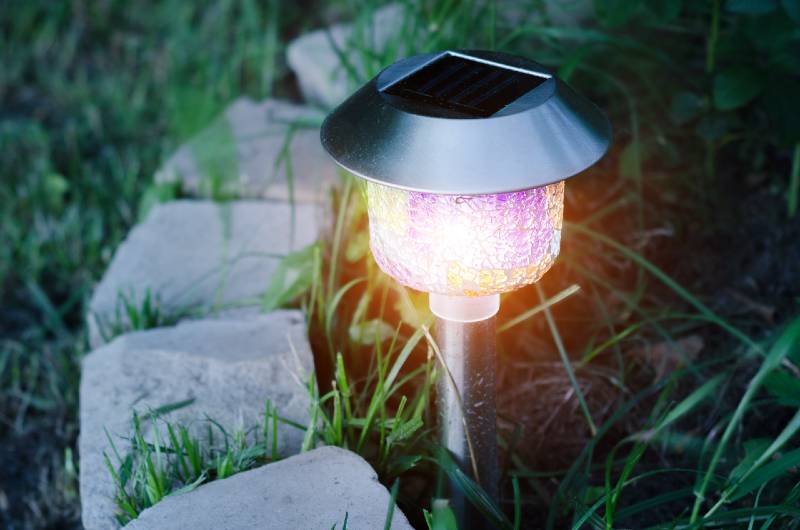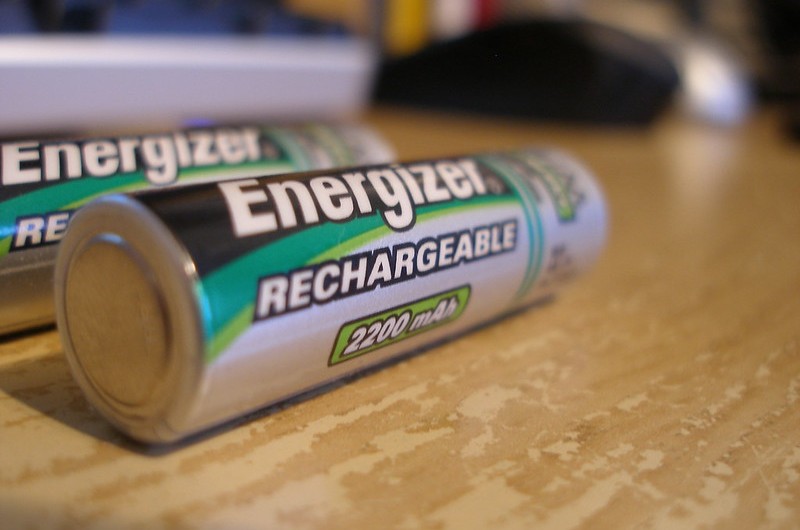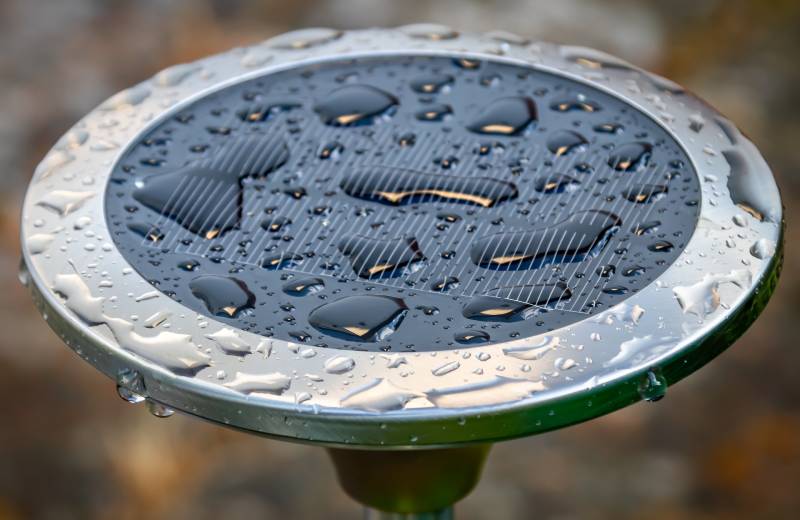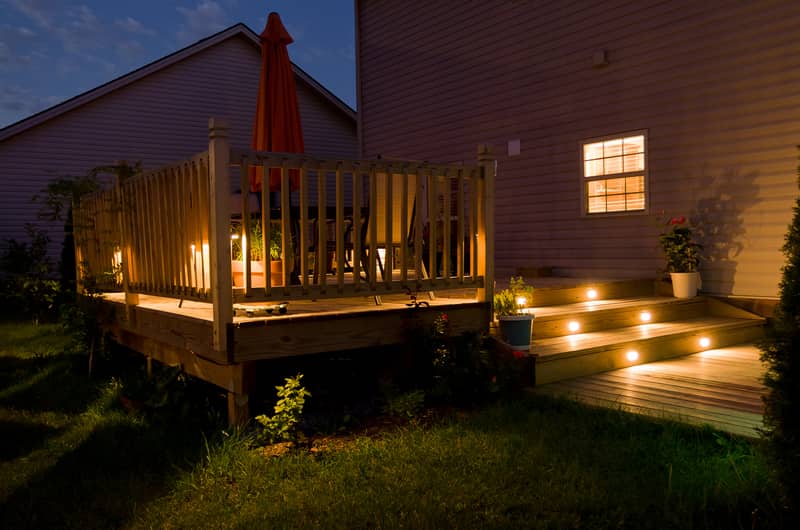Solar lights need batteries to store the electricity produced by the solar panels during the day. This allows the solar lights to operate at night when no sunlight is available.
My name is Kami, I’m an electrical engineer with over 5 years of experience in the solar field. In this article, I’ll go through everything you need to know about solar light batteries.
From how batteries work in solar lights to the best battery types for solar lights and how long do they last.
So without further ado, let’s jump right in.
Key Takeaways
- Solar lights need batteries to help them store the energy produced by the solar panels for later use at night or when sunlight is scarce.
- You need special batteries for solar lights as not all rechargeable batteries work in solar lights.
- The 3 most commonly used types of solar light batteries are Nickel Cadmium, Nickel Metal Hydride, and Lithium-ion batteries.
- On average, solar light batteries last for 2-5 years.
How Do Batteries Work in Solar Lights?
Solar light batteries work by storing and releasing the electricity generated by the solar panels during the day to make sure your lights are ready to use at night.
Here is a step-by-step explanation of how batteries work in solar lights:
- Solar Panel Absorption: During daylight hours, the solar panel absorbs sunlight. These cells convert the sunlight into direct current (DC) electricity.
- Charge Controller Regulation: The DC electricity then passes through a charge controller, which regulates the amount of current flowing to the battery. This prevents the battery from overcharging during particularly sunny periods and also prevents reverse current flow during the night when the panel isn’t producing power. A charge controller is only needed in large solar street lights. Most solar garden lights don’t need charge controllers as their solar panels aren’t powerful enough to overcharge the batteries.
- Energy Storage: Throughout the day, the solar panel continues to generate electricity and use that energy to charge the rechargeable battery. Most solar lights use either lead-acid, Ni-Cd, Ni-MH, or Li-ion batteries.
- Energy Release: At night, a photoresistor automatically turns on the light by activating the circuit between the battery and the LEDs.
- Light Emission: The electrical energy stored in the batteries during the day now powers the LEDs in the solar light, causing it to emit light.
- Recharge Cycle: The next day when sunlight hits the solar panel again, the cycle restarts with the panel generating electricity and recharging the battery.
This is a general overview and actual configurations can vary. For instance, some of the best solar security lights may use different types of batteries or have additional features like motion sensors.
But the basic principle of using sunlight to charge a battery which then powers the light during the night remains the same.
If you need to learn more, feel free to check our guide on how do solar lights work.
Do You Need Special Batteries for Solar Lights?
You need special rechargeable batteries for solar lights as not all batteries can be charged with solar panels.
An example of that would be the Amazon Basics Rechargeable batteries. They are great rechargeable batteries, but they just don’t work in solar lights.
If you’re looking for batteries that will work in your solar lights, I recommend reading our guide on the best rechargeable batteries for solar lights.
We individually tested over 50 batteries and made a list of the top performers, so make sure to check it out.
What Kind of Batteries Are Used for Solar Lights?
1. Ni-Cd Batteries
Nickel Cadmium (Ni-Cd) batteries were among the first rechargeable batteries used in solar lights. They typically offer around 500-800 charge cycles. [1]
However, they suffer from the “memory effect,” which can lead to a loss of up to 30% of their maximum energy capacity if not fully discharged before recharging.
They also have a high self-discharge rate of up to 20% per month.
2. NiMH Batteries
Nickel Metal Hydride (NiMH) batteries can deliver around 500-1000 charge cycles. [2]
They don’t suffer significantly from memory effect, and their self-discharge rate is lower than Ni-Cd batteries, typically around 10-15% per month.
However, they are not as efficient as Ni-Cd batteries at low temperatures.
3. Li-ion Batteries
Lithium-ion batteries offer the most charge cycles, typically between 1000-2000. [3]
They have minimal memory effect and a low self-discharge rate, often less than 5% per month.
They are highly efficient at various temperatures and have a high Discharge of Depth (DoD), meaning they can be discharged more deeply without damaging the battery.
Here’s a comparative table for the three battery types:
| Battery Type | Price | Lifespan (charge cycles) | Memory Loss (%) | Self Discharge per month (%) | DoD (%) |
|---|---|---|---|---|---|
| Ni-Cd | Low | 500-800 | Up to 30 | Up to 20 | 80-85 |
| NiMH | Medium | 500-1000 | Minimal | 10-15 | 80-85 |
| Li-ion | High | 1000-2000 | Minimal | Less than 5 | 80-90 |
Can You Use Regular Batteries in Solar Lights?
You can use regular batteries in solar lights as long as they match the current and voltage specification of your light. However, the solar panel won’t be able to charge the batteries during the day, and you’ll have to throw the batteries away once they’re depleted.
In other words, using regular batteries in your solar fence lights will turn them into battery powered lights, and you’ll have to replace the batteries every time they’re out of charge.
While this can be a proper solution during emergencies, or if you have indoor solar lights that don’t get enough sunlight, we don’t recommend it at all.
How Long Does It Take to Charge a Solar Light Battery?
It takes about 6-10 hours of direct sunlight to fully charge a solar light battery.
This time period depends on the battery capacity, the wattage of your light’s solar panel, and the intensity of the sunlight beam your lights receive.
The higher the solar panel wattage, the more electricity it will generate per hour, and the faster it will recharge the battery.
The battery size also plays a role, as the bigger your battery is, the longer it will take to fully charge it.
Do Solar Light Batteries Need to Be Replaced?
Solar light batteries need to be replaced because, with time, they start to lose their ability to hold a charge, resulting in lower run times at night.
How Do You Know Your Rechargeable Batteries Are Dead?
You can know if your rechargeable batteries are dead by using a multimeter.
A multimeter will tell you the exact voltage of your batteries. If the voltage is significantly lower than the battery’s rated voltage after a full day’s charge, the battery likely needs replacing.
How to Replace Batteries in Outdoor Solar Lights?
Here is how to replace batteries in outdoor solar lights:
- Turn off the solar lights
- Open the Battery Compartment
- Remove the Old Batteries
- Insert New Batteries
- Close the Battery Compartment
- Switch the Lights On
For more information, please check our step by step guide on how to replace batteries in solar lights.
Remember, it’s always important to dispose of old batteries properly as they can be harmful to the environment.
Many cities and towns have special recycling programs for batteries. It’s always a good idea to check with your local waste facility to find out how to properly dispose of old batteries in your area.
How Long Do Solar Light Batteries Last?
Solar light batteries typically last between 2 and 5 years before they need replacement.
How Often Do I Need to Replace Solar Light Batteries?
You need to replace your solar light batteries once every 3 years to ensure maximum solar light performance.
Do All Solar Lights Have Batteries?
All solar lights have batteries, or else they won’t be able to run at night or when sunlight is scarce.
Can You Use Any Rechargeable Battery in Solar Lights?
You need special rechargeable batteries for solar lights as many batteries can’t be charged with solar panels.
Will Solar Lights Work Without Batteries?
Most solar lights won’t work without batteries because their internal electric circuits are configured in a way that doesn’t support direct solar panel-LEDs operation.
Can You Charge Solar Light Batteries in a Battery Charger?
You can charge solar light batteries in a battery charger. Just make sure the charger matches the voltage and current requirements of the battery to avoid overcharging.
Last Thoughts
It’s important to remember that all rechargeable batteries do not last forever. They lose their capacity with every charge-discharge cycle, which means that they must be replaced on a regular basis.
We hope we have answered all your questions and if you still have any questions please share them with us.
References
- https://www.electronics-notes.com/articles/electronic_components/battery-technology/nicad-nicd-nickel-cadmium-technology.php
- https://www.techopedia.com/definition/24210/nickel-metal-hydride-battery-nimh
- https://ul.org/research/electrochemical-safety/getting-started-electrochemical-safety/what-are-lithium-ion






